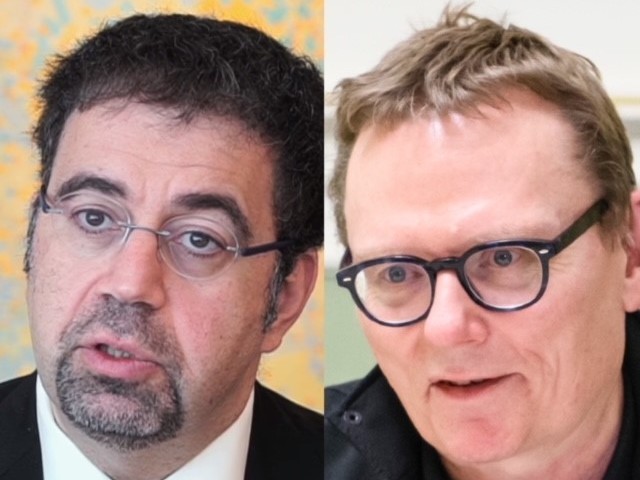 Daron Acemoglu and James Robinson (left to right) Daron Acemoglu - By 1MeJudice, CC BY 3.0, James Robinson - By Kmu.gov.ua, CC BY 4.0
Daron Acemoglu and James Robinson (left to right) Daron Acemoglu - By 1MeJudice, CC BY 3.0, James Robinson - By Kmu.gov.ua, CC BY 4.0
LSE alumni Daron Acemoglu (MSc Economics 1990 and PhD Economics 1992) and James A. Robinson (BSc Economics 1982), now Professors at MIT and the University of Chicago respectively, have today been jointly awarded the Nobel Prize in Economic Sciences.
Professors Acemoglu and Robinson share the award with Professor Simon Johnson (MIT) for their work demonstrating the importance of societal institutions for a country’s prosperity, and why there are such vast differences in prosperity between nations.
Societies with a poor rule of law and institutions that exploit the population do not generate growth or change for the better. Research by this year’s laureates helps us understand why.
Professor Ronny Razin, Head of the Department of Economics at LSE, said: “The Department of Economics at the LSE is immensely proud, though not surprised, that two of our alumni have been awarded the Nobel Prize in Economics this morning. Daron Acemoglu, a graduate of our MSc Economics and PhD programs, and James Robinson, a graduate of our BSc Economics program, have reshaped economists' thinking about prosperity and inequality by placing the role of political institutions at the forefront of their work.
“On the empirical front, they have made significant progress in establishing the importance of institutions for the prosperity of nations. Theoretically, they have provided a new and robust framework for understanding political institutional changes, such as the extension of voting rights and, more broadly, the transition of countries between different regime types.
“Their theories underpin the new mandate economists have claimed for the study of political economics, which is also one of the five challenges in social sciences that our new LSE president has tasked LSE with addressing.”
Professor Sir Tim Besley said: “Their pathbreaking work has changed the way in which we think about the relationship between economics and politics in the process of development.”
Sir Christopher Pissarides said: “Daron impressed me as an exceptionally creative student both at the MSc and PhD levels. He went on to develop his ideas, integrating them with those of his co-authors, not only for the benefit of their academic colleagues but for the benefit of humanity too: to understand the causes of underdevelopment and poverty. He, Johnson, and Robinson richly deserve the prize.”
Jakob Svensson, Chair of the Committee for the Prize in Economic Sciences, said: “Reducing the vast differences in income between countries is one of our time’s greatest challenges. The laureates have demonstrated the importance of societal institutions for achieving this.”
Daron Acemoglu received an MSc in mathematical economics and econometrics from LSE in 1990, and a PhD in economics from LSE in 1992. Since 1993, he has held the academic positions of Lecturer at LSE, and Assistant Professor, Pentti Kouri Associate Professor, and Professor of Economics at MIT. In 2004, he gave the Lionel Robbins Memorial Lecture at LSE and in 2023 he spoke at an event on Rethinking market capitalism: Innovation and the Path to Shared Prosperity hosted by LSE’s United States Centre.
James Robinson received a BSc in Economics from LSE in 1982. He then received a master’s degree from the University of Warwick and a PhD from Yale University. Before joining the University of Chicago, he taught at the University of Melbourne, the University of Southern California, the University of California at Berkeley and Harvard University. An economist and political scientist, he has conducted influential research in the field of political and economic development and the relationships between political power and institutions and prosperity.
To find out more about this year’s award, please visit: The Prize in Economic Sciences 2024 - Press release - NobelPrize.org
To read about other Nobel Prize winners from LSE, visit the LSE History blog.